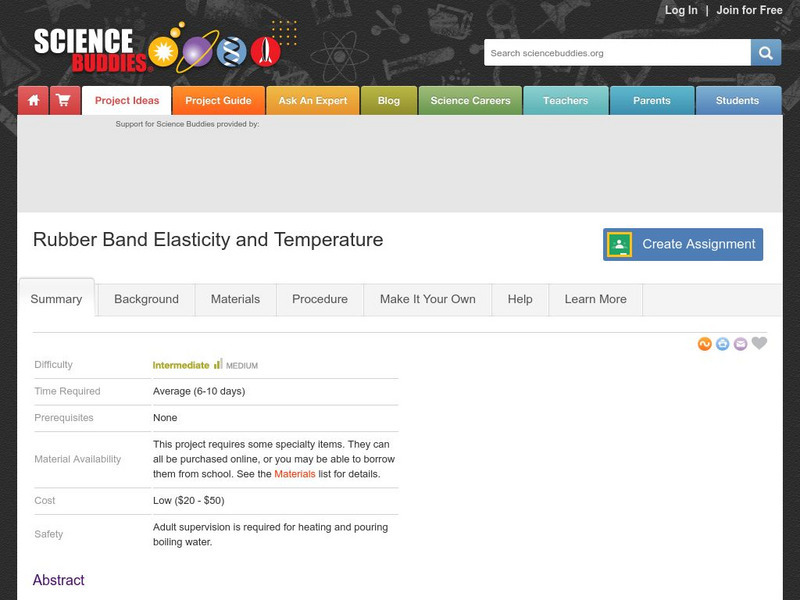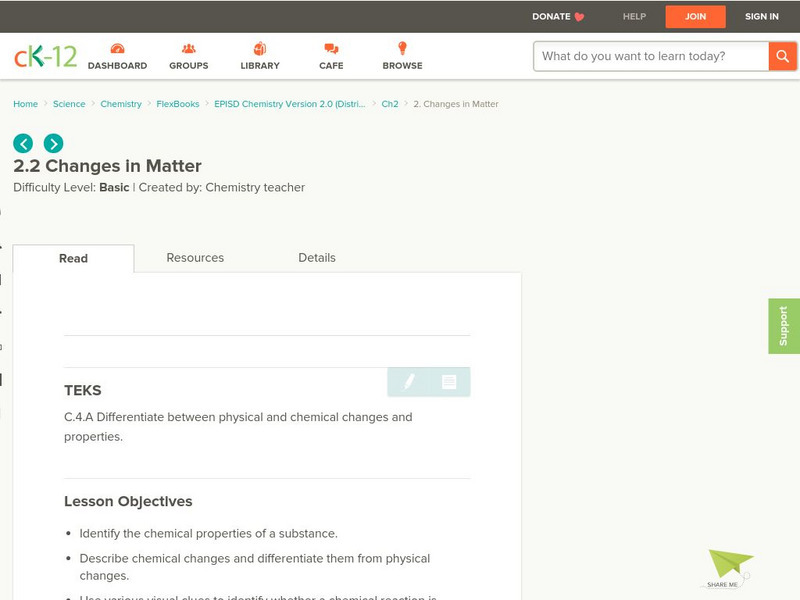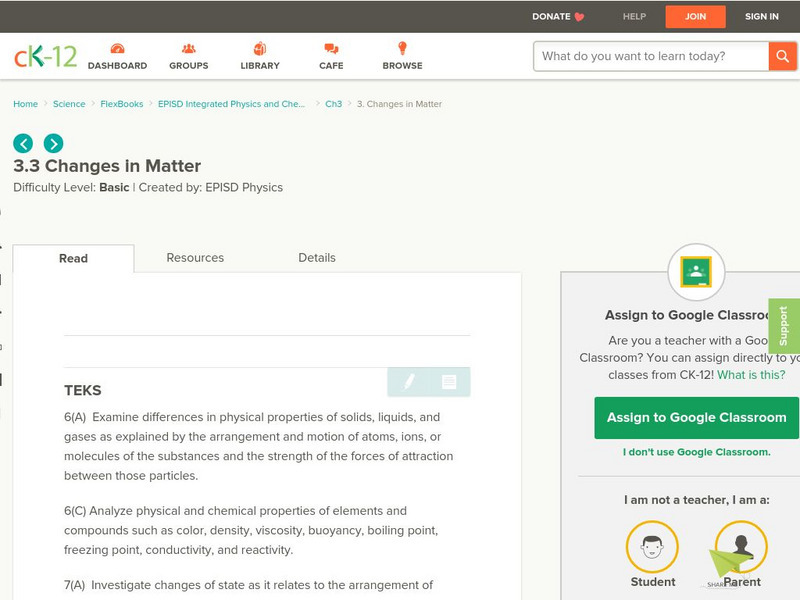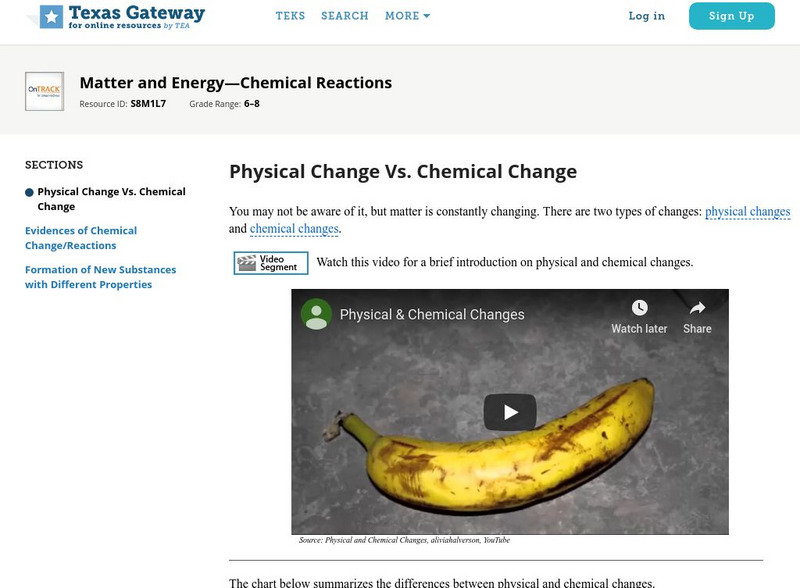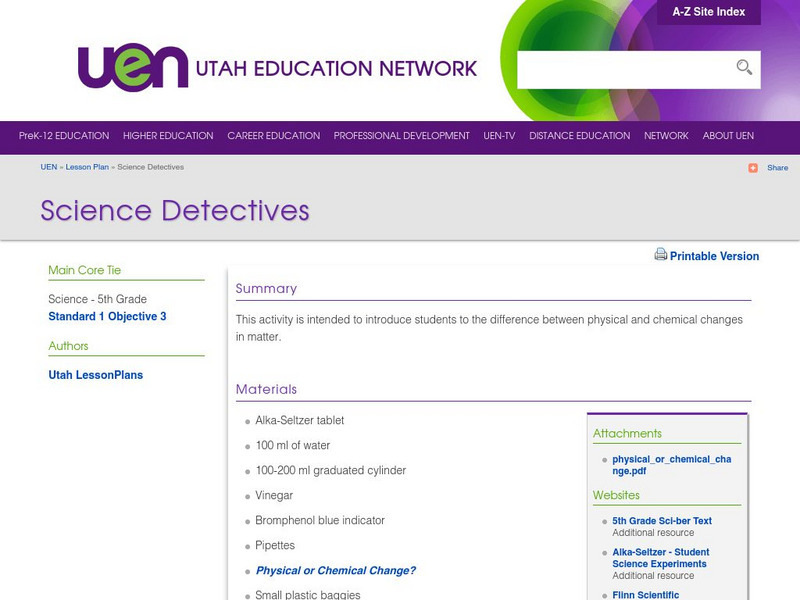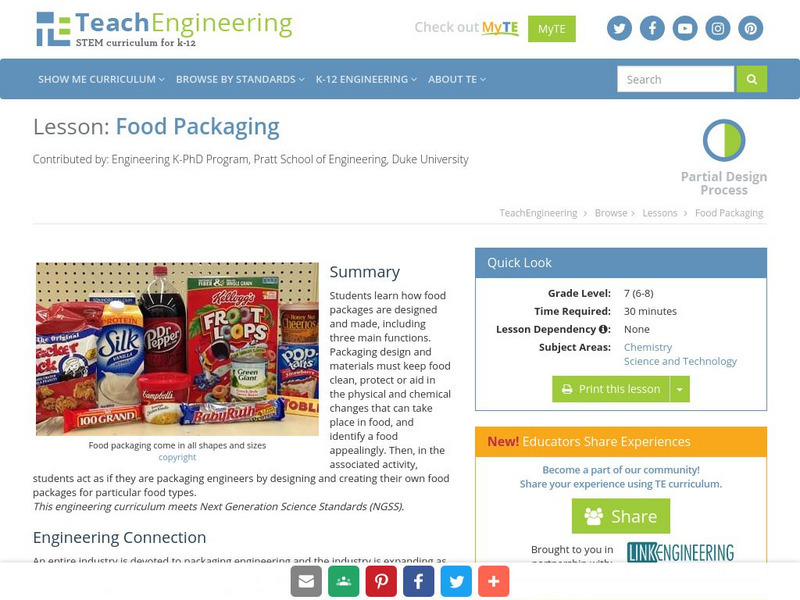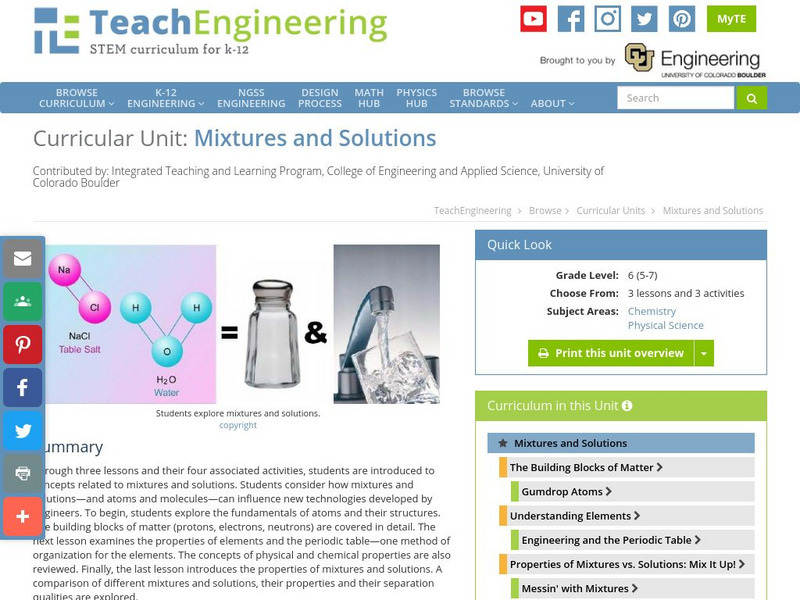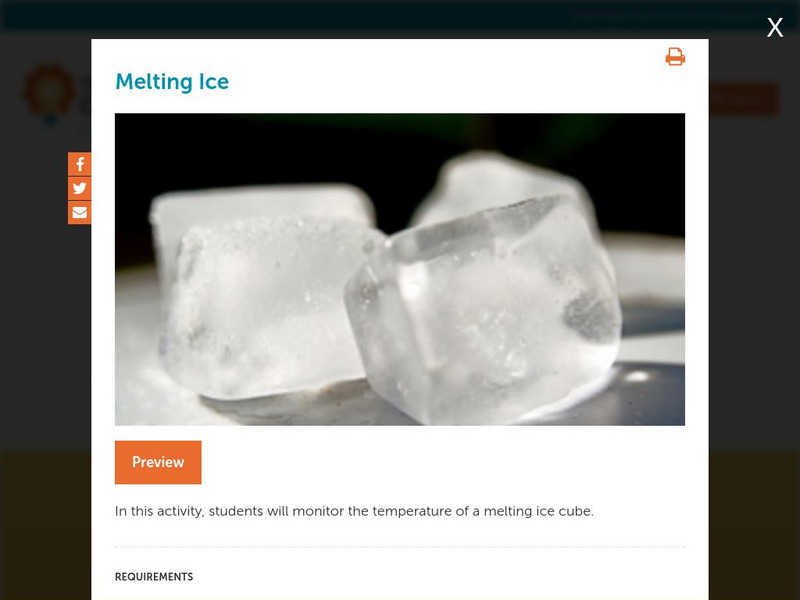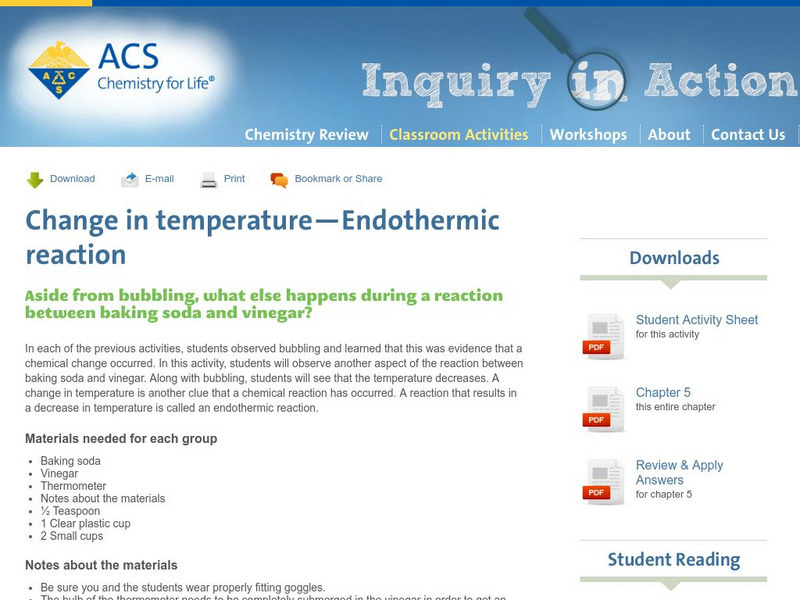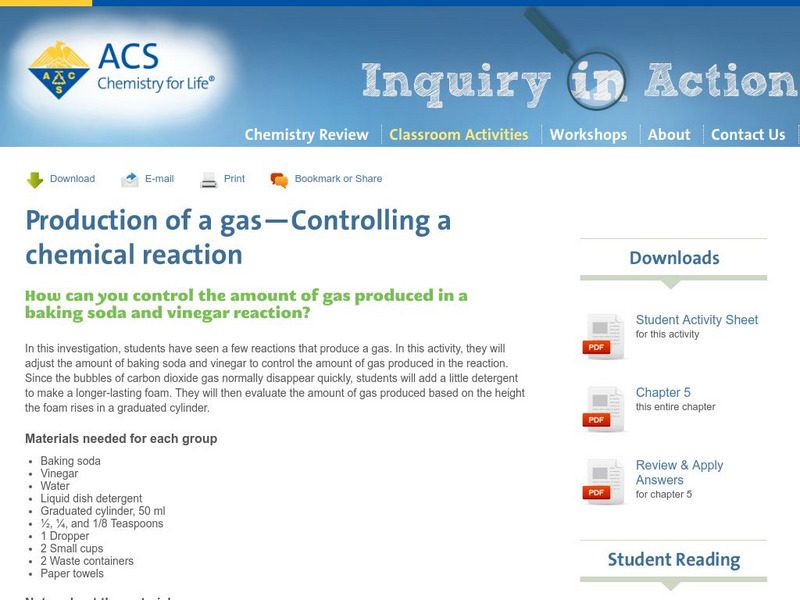American Chemical Society
Inquiry in Action: Using Chemical Change to Identify an Unknown
This activity explores how students could use chemical changes to identify unknown substances. Lab activity includes student and teacher worksheets.
Science Buddies
Science Buddies: Rubber Band Elasticity and Temperature
Many materials expand when heated and contract when cooled. What do you think will happen to the elasticity (stretchiness) of a rubber band when it is heated or cooled to various temperatures?
American Chemical Society
Middle School Chemistry: Chapter 6: Chemical Change
Twelve interactive chemistry lessons about chemical changes complete with handouts and animations.
Other
Science4 Us: Changes in Matter
Through an instructional video, games, and activities, students explore three types of change matter makes: physical change, in which only the shape of the matter changes; physical phase change in which matter changes to a different form...
CK-12 Foundation
Ck 12: Changes in Matter
[Free Registration/Login may be required to access all resource tools.] In the following online tutorial students identify the chemical properties of a substance and describe chemical changes and differentiate them from physical changes....
CK-12 Foundation
Ck 12: Changes in Matter
[Free Registration/Login may be required to access all resource tools.] Students will describe methods for separating mixtures, such as chromatography, distillation, fractional distillation, evaporation, and filtration. They will also...
American Chemical Society
American Chemical Society: Science for Kids: Chemical and Physical Change
Engaging hands-on science lessons for grades 2-6 on chemical and physical changes.
Texas Education Agency
Texas Gateway: Matter and Energy: Chemical Reactions
Do you know the difference between a physical and a chemical change? This interactive tutorial will explore these concepts!
Utah Education Network
Uen: Science Detectives
Young scholars are given a scenario for this lesson where they must use investigative skills like a detective would to decide whether changes that happen to objects in the story are physical or chemical. They then conduct an experiment...
BBC
Bbc Schools: Ks2 Bitesize: Science: Materials: Changes in Materials
Help solve the mystery and find the missing crystal. Following the activity, read more about chemical and physical changes, and then take a quick quiz to check for understanding.
TeachEngineering
Teach Engineering: Food Packaging
This instructional activity focuses on how food packages are designed and made. Students will learn three of the main functions of a food package. They will learn what is necessary of the design and materials of a package to keep food...
TeachEngineering
Teach Engineering: Mixtures and Solutions
This unit covers introductory concepts of mixtures and solutions. Students think about how mixtures and solutions, and atoms and molecules can influence new technologies developed by engineers. The first lesson explores the fundamentals...
Concord Consortium
Concord Consortium: Stem Resources: Melting Ice
Using temperature probes, students will monitor the temperature of melting ice cubes in different situations. This lab activity, allows students to view the procedure and answer questions online that can be saved and evaluated by the...
Utah Education Network
Uen: Physically Change Shape of Object
Science fair project tests whether students can construct a shape out of clay that will float.
American Chemical Society
Inquiry in Action: Exploring Baking Powder
An activity that allows students to discover the active ingredients in baking powder by studying chemical change. Lab activity includes both teacher and student instructions.
American Chemical Society
Inquiry in Action: Change in Temperature: Endothermic Reaction
In this activity, students will observe another aspect of a chemical change which is a change in temperature. In this reaction, students will experiment with an endothermic reaction.
American Chemical Society
Inquiry in Action: Production of a Gas: Controlling a Chemical Reaction
Observe reactions that produce gases in this lab activity! Students observe chemical changes as they evaluate the amount of gas produced. This lab activity includes both student and teacher instruction sheets.
American Chemical Society
Middle School Chemistry: Lesson Plans: Using Chemical Change to Identify Unknown
Students observe reactions of liquids with different known powders in this lesson. Unknown powders are then identified using characteristic chemical changes.Site includes a procedure, teacher instructions, and video instruction.
Concord Consortium
Concord Consortium: Stem Resources: Baggie Chemistry
Observe chemical and physical changes with this lab using everyday household items. Lab includes procedure and online data collection tool where answers can be saved and graded by teacher.
Center of Science and Industry
Cosi Columbus: A Swell Activity With Beans [Pdf]
Learn about absorption in this hands-on science experiment. Includes full list of materials, procedures, and scientific explanation of what happens to different types of beans as they soak in water in a test vial.
E-learning for Kids
E Learning for Kids: Science: Arctic Ocean: How Can We Change Materials?
Join Jacob on the Nova Zembla Expedition, and help him use suitable materials for building his house.
Scholastic
Scholastic: Dirtmeister's Science Lab: Matter
Step into Dirtmeister's Science Lab as he explores the challenge question: "How can you force a physical change in matter?" Learn about matter, make your predictions and then do the experiment.
Science Education Resource Center at Carleton College
Serc: Investigating Changes of State: Chemical and Physical Changes
In this chemistry lab, students will investigate, observe, and describe a variety of chemical and physical changes in matter. They will understand that this is part of everyday life.
Science Education Resource Center at Carleton College
Serc: Plastic Polymers: Investigating Their Flexibility
Students will use their prior knowledge about changes of matter to develop a hypothesis to test the physical properties of materials such as plastic (polymers) and how its chemical properties allow it to have unique physical properties.



